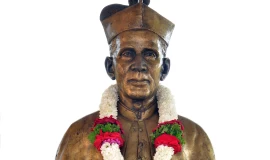MSW
Students on completion of MSW programme will be able to :
PSO1.Understand the value base of the profession, its ethical standards, principles, and practice.
PSO2. Understand the forms and mechanisms of oppression and discrimination.
PSO3. Apply strategies of social change for social and economic justice.
PSO4. Use theoretical frameworks supported by empirical evidence to understand individual development and behavior across the life span and the interactions among individuals and between individuals, families, groups, organizations, and communities.
PSO5. Apply the knowledge and skills of generalist social work practice with systems.
PSO6. Apply critical thinking skills within the context of professional social work practice.
PSO7. Analyze, formulate, and influence social policies.
PSO8. Evaluate research studies, apply research findings to practice, and evaluate their own practice interventions
PSO9. Use communication skills differentially across client populations, colleagues, and communities.
PSO10. Use supervision and consultation appropriate to social work practice. PSO11. Function within the structure of organizations and service delivery systems and seek necessary organizational change.
PSO12. Use opportunities for continuing professional education to enhance their professional development.
PSO13. Communicate effectively by presenting complex information in a clear and concise manner orally, on paper and using ICT.
PSO14. Demonstrate information technology skills, especially in the areas of information retrieval, literature searching and library databases.
PSO15. Acquire knowledge, skills and attitude to become more suitable for employment in NGOs, government and industry.
M.Com
Students on completion of M.Com programme will be able to :
PSO1. Acquire strong subject-matter expertise in finance, financial instruments and markets.
PSO2. Identify, analyze and solve business problems.
PSO3. Analyse commerce / business issues in the international context.
PSO4. Apply basic mathematical and statistical skills necessary for analysis of a range of problems in accounting, marketing, management and finance and use critical reasoning to evaluate information.
PSO5. Make use of quantitative skills necessary for analysis and critical reasoning.
PSO6. Express ideas clearly and logically in oral and written formats.
PSO7. Master a body of knowledge in one area of specialization within the discipline of Commerce.
PSO8. Communicate effectively and to understand inter-disciplinary expressions .
PSO9. Use opportunities for continuing professional education to enhance their
professional development.
PSO10. Demonstrate skills for life-long learning.
PSO11. Develop advanced theoretical knowledge and research capabilities in the preparation for academic and research focused careers.
PSO12. Understand and use information technology tools, techniques and resources.
PSO13. Communicate effectively by presenting complex information in a clear and concise manner orally, on paper and using ICT.
PSO14. Demonstrate information technology skills, especially in the areas of information retrieval, literature searching and library databases.
PSO15. Acquire knowledge, skills and attitude to become more suitable for self employment and the emerging employment market.
M.Sc. – Physics
Students on completion of M.Sc-Physics programme will be able to :
PSO1. Demonstrate substantial knowledge in physics, basic knowledge in mathematics and knowledge in supported fields like computer science and show advanced knowledge in some areas in physics.
PSO2. Apply advanced theoretical and/or experimental methods, including the use of numerical methods and simulations.
PSO3. Disseminate subject matter and results to both specialists and a broader audience and know the historical development of physics, its possibilities and limitations, and understand the value of lifelong learning.
PSO4. Understand the role of physics in society and has the background to consider ethical problems, gather, assess, and make use of new information.
PSO5. Acquire an international perspective on specialized areas in physics.
PSO6. Communicate effectively and to understand inter-disciplinary expressions and develop and renew scientific competence independently.
PSO7. Enter new problem areas that require an analytic and innovative approach and successfully carry out advanced tasks and projects, both independently and in collaboration with others, and also across disciplines.
PSO8. Demonstrate background and experience required to model, analyze, and solve advanced problems in physics.
PSO9. Impart intensive knowledge and training required for research and for professional application.
PSO10. Prove research experience within a specific field of physics, through a supervised project.
PSO11. Critically and independently assess and evaluate research methods and results.
PSO12. Use opportunities for continuing professional education to enhance professional development.
PSO13. Communicate effectively by presenting complex information in a clear and concise manner orally, on paper and using ICT.
PSO14. Demonstrate information technology skills, especially in the areas of information retrieval, literature searching and library databases.
PSO15. Acquire knowledge, skills and attitude to become more suitable for employment.
M.Sc. – Computer Science
Students on completion of M.Sc. – Computer Science programme will be able to :
PSO1. Operate computer systems of different types independently.
PSO2. Use different computer applications independently.
PSO3. Implement business logic into algorithms and algorithms into code.
PSO4. Write computer programs using programming languages and development environments and analyze requirements for the development of a software product.
PSO5. Manage data using database management tools and organize files and backup / recover data using utilities.
PSO6. Troubleshoot and manage computer hardware and software resources.
PSO7. Use supervision and consultation appropriate to IT sector.
PSO8. Use opportunities for continuing professional education to enhance their professional development.
PSO9. Communicate effectively and to understand inter-disciplinary expressions .
PSO10. Demonstrate information technology skills, especially in the areas of information retrieval, literature searching and library databases.
PSO11. Acquire knowledge, skills and attitude to become more suitable for self employment and the emerging employment market.
PSO12. Use opportunities for continuing professional education to enhance professional development.
PSO13. Communicate effectively by presenting complex information in a clear and concise manner orally, on paper and using ICT.
PSO14. Demonstrate information technology skills, especially in the areas of information retrieval, literature searching and library databases.
PSO15. Acquire knowledge, skills and attitude to become more suitable for employment.
M.Sc. – Mathematics
Students on completion of M.Sc. – Mathematics programme will be able to :
PSO1. Demonstrate substantial knowledge in mathematics and knowledge in supported fields like computer science.
PSO2. Know the historical development of mathematics, its application, and understand the value of lifelong learning, gather, assess, and make use of new information.
PSO3. Acquire an international perspective on specialized areas in mathematics and show advanced knowledge in specialized areas in mathematics.
PSO4. Demonstrate background and experience required to model, analyse, and solve advanced problems in mathematics.
PSO5. Understand the role of mathematics in society encompassing diverse fields and enter new problem areas that require an analytic and innovative approach.
PSO6. Disseminate subject matter and results to both specialists and a broader audience.
PSO7. Successfully carry out advanced tasks and projects, both independently and in collaboration with others.
PSO8. Impart intensive knowledge and training required for research and for professional application.
PSO9. Prove research experience within a specific field of mathematics, through a supervised project.
PSO10. Critically and independently assess and evaluate research methods and results.
PSO11. Communicate effectively and to understand inter-disciplinary expressions.
PSO12. Use opportunities for continuing professional education to enhance professional development.
PSO13. Communicate effectively by presenting complex information in a clear and concise manner orally, on paper and using ICT.
PSO14. Demonstrate information technology skills, especially in the areas of information retrieval, literature searching and library databases.
PSO15. Acquire knowledge, skills and attitude to become more suitable for employment.
M.A. – Economics
Students on completion of M.A - Economics programme will be able to :
PSO1. Understand fundamental economic principles and be able to apply these ideas to analyze public policies, business practices, and real-world events.
PSO2. Understand at an advanced level about the complex economics mechanism that characterize modern society.
PSO3. Analyse how markets for goods and services function and how income is generated and distributed.
PSO4. Analyze a problem and draw correct inferences using qualitative and/or quantitative analysis.
PSO5. Use microeconomic tools and concepts to address public policy issues such as competition, environmental protection, financial regulation, innovation and intellectual property, labor law, or taxation.
PSO6. Give insight into energy economics, competition policy, industrial economics, financial markets, environmental and resource economics, development economics and international trade and globalization.
PSO7. Use of econometric- and mathematical methods.
PSO8. Apply mathematical methods, through modeling and large-scale data analysis.
PSO9. Identify compile, interpret, and analyze quantitative economic data by expressing relationships between concepts through graphs, statistical or econometric analysis.
PSO10. Understand basic econometric modeling techniques.
PSO11. Develop and estimate economic models, test economic hypothesis, and perform basic forecasting tasks.
PSO12. Undertake applied work and research projects in economics.
PSO13. Communicate effectively by presenting complex information in a clear and concise manner orally, on paper and using ICT.
PSO14. Demonstrate information technology skills, especially in the areas of information retrieval, literature searching and library databases.
PSO15. Acquire knowledge, skills and attitude to become more suitable for self employment and the emerging employment market.






